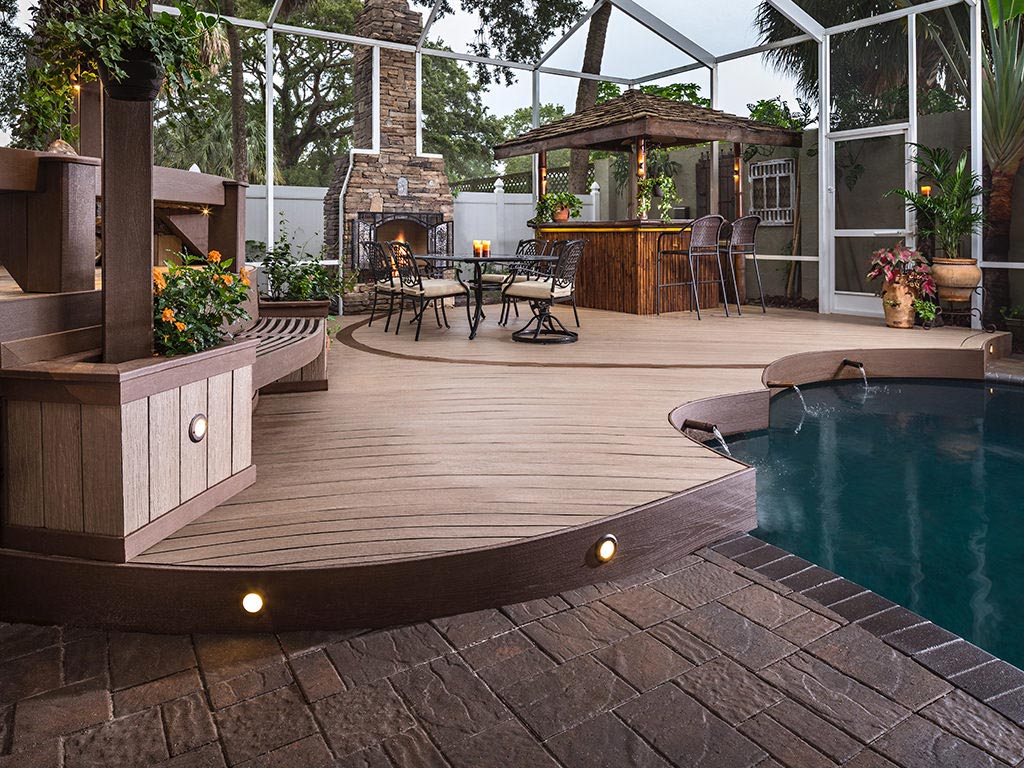Many contractors specialize in deck installation Austin for both residential and commercial properties.
Many contractors specialize in deck installation Austin for both residential and commercial properties.
Blog Article
How to Select the Right Products for Your Deck Installation Job
Choosing the ideal materials for your deck setup job can appear challenging. The secret is to stabilize your spending plan, design choices, and lifestyle requires to produce a deck that will boost your outside area for years to come.
Recognizing the Various Sorts Of Deck Products
When starting a deck setup task, the selection of materials ends up being a critical decision. Numerous alternatives are available, each with unique features and aesthetic appeal. Conventional wood, as an example, uses an ageless, all-natural look and is typically a lot more cost-efficient. It can warp over time and needs regular maintenance. Compound products, on the various other hand, are a mix of wood and plastic, providing sturdiness and resistance to weather aspects. They require less upkeep contrasted to wood yet are generally more pricey. An additional choice is plastic, which is virtually maintenance-free and immune to pests and rot, albeit less natural-looking. By recognizing these differences, property owners can make a much more educated decision on one of the most suitable deck material for their particular requirements.
Evaluating the Longevity and Upkeep Demands of Deck Products
Assessing the sturdiness and upkeep requirements of deck materials is a crucial action in deck installation. Toughness includes the product's ability to withstand severe climate problems, wear and tear, and its durability.
Comprehending upkeep needs is just as important. Some materials need routine sealing or discoloring to maintain their appearance and withstand wetness damage, while others, like composite decking, require much less upkeep. By evaluating these elements, one can pick one of the most suitable decking product, guaranteeing a balance in between resilience, maintenance demands, and aesthetic allure.
Expense Analysis: Contrasting Timber and Compound Decking
Although price might originally appear like an additional problem, it is a substantial factor when comparing timber and composite outdoor decking. Wood, usually a less costly option, has a lower ahead of time cost. Over time, maintenance expenses can accumulate, potentially making timber extra costly in the long run. These upkeep costs may include discoloration, securing, or replacing damaged boards. On the other hand, composite outdoor decking, while costlier originally, calls for much less upkeep, potentially minimizing lasting costs. It's vital to keep in mind that composite decking isn't invulnerable to wear and tear, and replacement prices can be high. Therefore, prospective deck proprietors should consider their budget plan and desire to preserve their decks when making a decision between timber and composite outdoor decking.
Aesthetics and Style Versatility of Decking Materials
While cost is a crucial consideration, the aesthetic charm and layout adaptability of decking products additionally play a substantial function in the decision-making procedure. Different materials supply differing degrees of aesthetic allure. For instance, all-natural wood outdoor decking gives a classic, timeless look, while composite products supply a large variety of shades and appearances to fit varied preferences and designs. Likewise, design adaptability refers to the capability to shape and adjust the outdoor decking product to satisfy details design requirements. Wood, for instance, uses high design adaptability because of its convenience of cutting and shaping. Composite products, while less flexible in style, are still versatile sufficient for the majority of deck layouts. These variables, as a result, are crucial components in the selection of decking product.
Environmental Influence of Decking Products
When choosing outdoor decking products, one must take into consideration not only visual appeals and longevity, yet likewise the ecological effect. It is necessary to analyze the sustainability of materials and discover recycled decking alternatives. Moreover, understanding the potential effect on neighborhood communities will ensure a more eco accountable option.
Assessing Product Sustainability
In the world of deck construction, analyzing material sustainability is an important action. Composite outdoor decking materials typically integrate wood and plastic, reducing the need for brand-new lumber but enhancing dependence on fossil gas - deck installation. Therefore, the option of decking materials need to stabilize performance, aesthetics, expense, and sustainability to make sure a liable and resilient installation.
Recycled Decking Options

Compound decking is specifically preferred because of its toughness and simplicity of upkeep. It's resistant to rot, insects, and fading, making it a durable option. Recycled plastic decking, on the other hand, click here for more info is very resilient and requires very little upkeep. While these materials may carry a higher initial price, their long life and reduced ecological effect make them a smart investment for the eco-conscious house owner.

Impact on Local Communities
While the benefits of using recycled materials for decking can not be overstated, it's just as essential to consider the broader environmental ramifications of these choices. The extraction, processing, and transportation of products can greatly affect regional ecological communities. Deforestation for lumber decking adds to habitat loss and environment modification. Even the production of composite materials can launch hazardous exhausts. On the other hand, using recycled or sustainably sourced products can help alleviate these effects. Furthermore, taking into consideration the lifespan of products can decrease ecological impact; longer-lasting options call for less constant substitute, hence preserving resources. Appropriate disposal of old decking is important to minimizing land fill waste. Basically, an eco-conscious deck job demands cautious material option, lasting sourcing, and accountable disposal.
Making Your Final Decision: Tips for Picking the Best Deck Products
As the short article shifts into the subtopic of "Making Your Decision: Tips for Selecting the Finest Deck Products", it is vital to understand the variety of deck materials available. Striking a balance between sturdiness and aesthetics is important in this choice process. The complying with discussion will certainly guide readers in making an educated option based on these key considerations.
Understanding Different Deck Materials
The task of selecting the ideal materials for your deck installation can appear intimidating as a result of the vast variety of options offered. Nonetheless, comprehending the different materials can simplify this process. Wood is a popular choice, offering a classic visual and price. Sorts of timber made use of consist of pressure-treated lumber, cedar, and redwood. Composite products, made from a blend of wood and plastic, are low-maintenance and immune to rot and insects. Plastic or PVC decks are also more sturdy and require less maintenance than composite materials, yet they can look less natural. Light weight aluminum decks are solid, light-weight, and immune to rot, but they are also the most costly alternative. Each product has its own benefits and disadvantages, making it crucial to consider your specific needs before making a decision.
Toughness vs. Visual Appeals Equilibrium
Stabilizing toughness over at this website with appearances can be an obstacle when picking deck products. The choice often boils down to personal choices and the deck's intended usage. High-traffic locations might require durable products like composite decking, which stands up to wear and tear however may do not have the natural appeal of wood. On the other hand, timber supplies a timeless allure and heat that artificial materials battle to duplicate. Nevertheless, it requires more upkeep and might not last as long. As a result, property owners need to strike a balance, taking into consideration both the deck's practical needs and their visual choices. By doing so, they can guarantee their deck remains a functional and eye-catching outdoor area for several years to come.
Conclusion
In final thought, picking the ideal materials for your deck installation task needs cautious factor to consider of variables such as resilience, upkeep, expense, aesthetic appeals, and environmental influence. Whether you go with typical wood or composite products, your option must align with your spending plan, design choices, and lifestyle. Inevitably, the most effective outdoor decking material is one that improves your outside room Home Page and gives satisfaction for several years ahead.
Report this page